Sustainable Transportation
At the seventh event of the Sustainable Duluth series, over 30 residents from around Duluth gathered to discuss and learn about sustainable and accessible transportation. Local experts presented on various aspects of transportation, providing valuable insights for attendees. If you missed the event, here’s a summary:
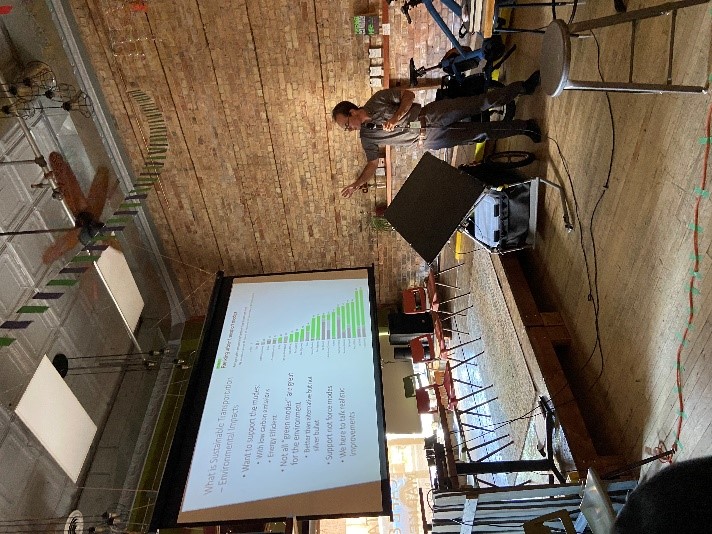
The first presenter was Miles Hansen, an AmeriCorps VISTA working with James Gittemeier, the Senior Transportation Planner in the City of Duluth Planning and Development Division. The department is responsible for implementing the city's housing goals, developing the local economy, and protecting environmental quality. Miles presented an overview of the fiscal, social, and environmental impacts of transportation. He highlighted that while not all sustainable transportation modes have minimal environmental impacts, some are better than others. Different transportation modes also vary in their initial purchase costs, maintenance expenses, and community-wide upkeep such as road repairs. On average, people take 7-19 trips per day, most of which are under 5 miles. Therefore, considering different transportation modes for these shorter trips is crucial. Learn more about the department's projects here. Learn more about projects the department is working on here.
Next, Alex Popp, a project engineer with the City of Duluth, presented on the ongoing reconstruction of West Superior Street. Alex is primarily responsible for the design and construction of municipal and state roadways. He shared that the West Superior Street Reconstruction Project has been heavily influenced by public input gathered through various meetings. Between each meeting, public opinions were incorporated into the design. While the design process is still ongoing, current renderings show wide sidewalks, abundant trees and garden spaces, and safe pedestrian crossings. Read more about the project here.
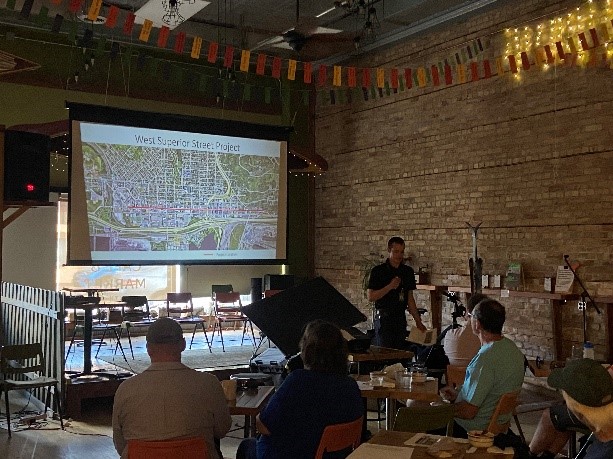
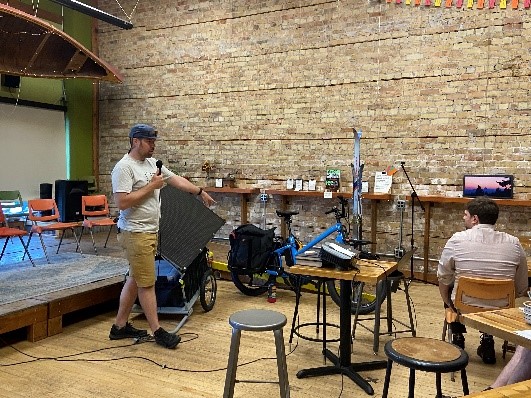
Brad Little, the owner and operator of e-Bike Duluth, was the third presenter. Brad arrived at the event via a cargo e-bike, equipped with large front and rear racks for hauling and a trailer with a solar panel cover to charge the bike. He explained how e-bikes are a game-changer for reducing car trips in Duluth, especially given the city's many hills. There are three classes of e-bikes to choose from, based on the level of electric assistance and speed desired. E-Bike Duluth can help you find the best bike for your needs.
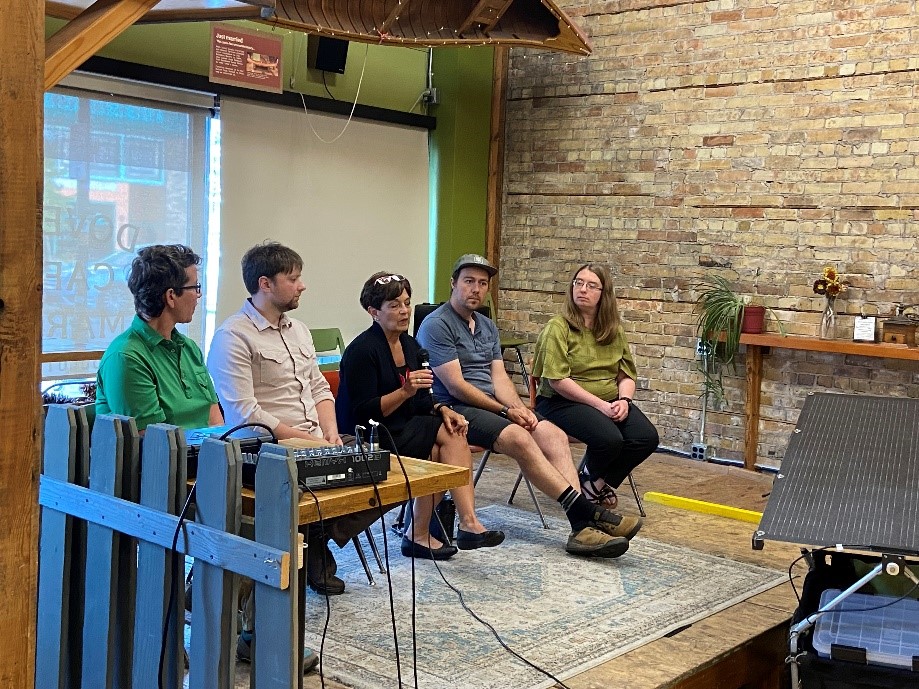
Following the presentations, a panel of five local community leaders in transportation discussed challenges and paths forward.
Andrea Crouse is the Community Development Manager at Zeitgeist Center for Arts and Community which seeks to grow local leadership and engagement and promote active living and community design informed by grassroots input. They focus on listening to voices in the Hillside neighborhood, especially for public health support. Andrea explained how this neighborhood was previously redlined and is still not a safe walkable place. They urge community members to advocate for more bike infrastructure at local businesses. Learn more about Zeitgeist’s projects here.
Elizabeth Ream, the Transportation Coach at Community Action Duluth (CAD), described CAD’s transportation programs designed to help people gain independence through driving, busing, or other modes of transportation. She emphasized the importance of meeting people where they are and addressing their current transportation needs. Elizabeth hopes to expand the program to include more sustainable transportation options. Learn more about CAD’s programs here.
Vibrant Streets Duluth is a campaign started by local residents and business owners to find solutions and promote community-wide conversations on making sidewalks safe and accessible year-round. Yeuhan discussed how current infrastructure in Duluth is not designed with bikes and pedestrians in mind, unlike some European countries.
Sandra Wheeler, the Assistant Director of Operations at Arrowhead Transit, shared insights into the largest rural public transportation system in Minnesota. Arrowhead Transit provides reliable and accessible transportation services, including scheduled services and the Volunteer Driver Program. At the core of their offerings is Dial-A-Ride, a flexible and personalized public transportation solution. Sandra announced that the program is taking a big step forward with the addition of its first electric bus.
Ansel Schimpff, the Executive Director of Cyclists of Gitchee Gumee Shores (COGGS), a non-profit mountain bike advocacy organization in the Twin Ports area, explained that the biggest barrier to biking is often the upfront cost. He is working with local organizations and businesses to improve bike access for the community. Ansel hopes to enhance infrastructure within parks to help community members learn to bike before hitting the trails. Learn more here.
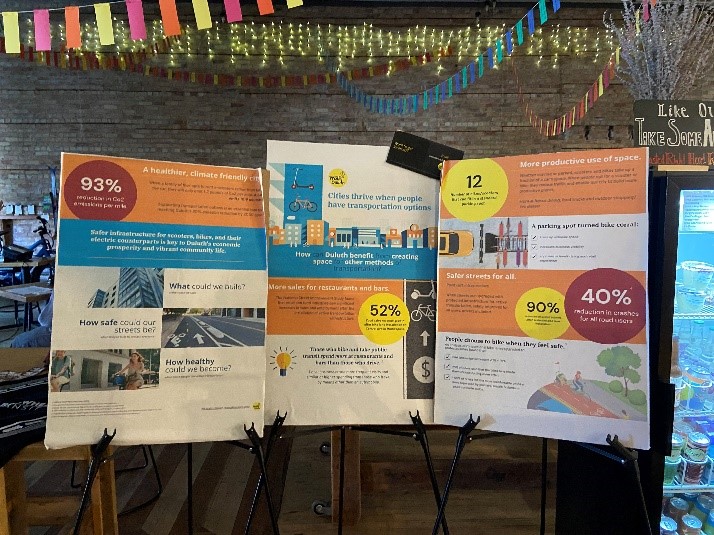
Do you still have questions after this session? Come to our next and final session which will dive into sustainable policy, on Thursday, August 15th, 6-7:30pm!




